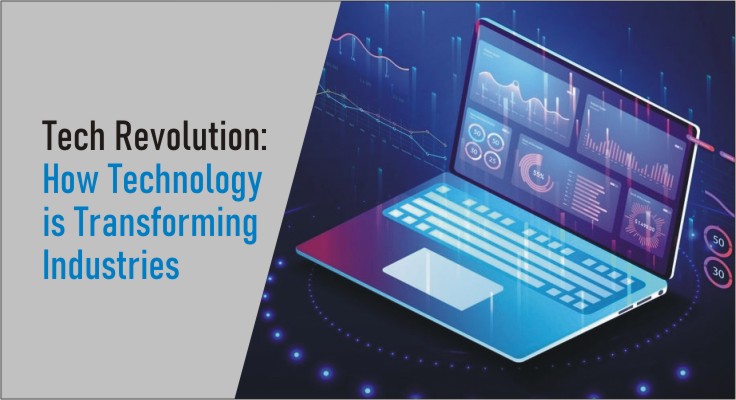The modern era is marked by a digital transformation that is reshaping industries across the globe. From healthcare to manufacturing, technology has become the cornerstone of innovation, driving efficiency, reducing costs, and enhancing the customer experience. This tech revolution is not just a trend; it is a fundamental shift that is altering the way industries operate, compete, and evolve.
The Pervasiveness of Technology
Technology permeates nearly every aspect of our lives. Businesses that once relied on manual processes and traditional methods are now leveraging advanced tools such as artificial intelligence (AI), machine learning (ML), and the Internet of Things (IoT). This digital shift is not confined to specific sectors; it spans across retail, education, transportation, agriculture, and more. These advancements have enabled industries to address long-standing challenges while opening new avenues for growth.
Key Technologies Driving Change
1. Artificial Intelligence and Machine Learning
AI and ML are at the forefront of the technological revolution. From chatbots providing 24/7 customer service to predictive analytics optimizing supply chains, these tools enable businesses to make data-driven decisions. For example, in the healthcare sector, AI-powered algorithms are used to detect diseases like cancer at earlier stages, potentially saving countless lives. Meanwhile, in finance, AI-driven fraud detection systems safeguard transactions and protect sensitive information.
2. Internet of Things (IoT)
IoT connects devices, systems, and services, creating a network of smart, interconnected entities. This technology is transforming industries like agriculture, where IoT-enabled sensors monitor soil conditions and optimize irrigation, leading to increased crop yields. In smart cities, IoT applications manage energy consumption, traffic flow, and waste management, contributing to sustainability and efficiency.
3. Blockchain Technology
Blockchain has gone beyond its cryptocurrency origins to revolutionize industries such as supply chain, healthcare, and real estate. By providing a decentralized and transparent ledger, blockchain ensures data integrity and enhances security. For instance, in the food industry, blockchain is used to track the journey of products from farm to table, ensuring quality and safety.
4. Robotics and Automation
Robots and automated systems are redefining production lines, logistics, and even customer interactions. In manufacturing, robots assemble products with precision and speed, reducing errors and costs. Autonomous vehicles and drones are making their mark in logistics, promising faster and more efficient deliveries.
5. Cloud Computing
The adoption of cloud technology has enabled businesses to store, access, and process data remotely. Cloud-based solutions offer scalability and flexibility, allowing businesses to adapt quickly to changing market demands. This is particularly evident in industries like software development and e-commerce, where cloud platforms support seamless operations and global reach.
Industry-Specific Transformations
Healthcare
The healthcare industry is undergoing a profound transformation through technology. Telemedicine has become a lifeline for patients in remote areas, providing access to consultations and treatments without the need for travel. Wearable devices like fitness trackers and smartwatches monitor vital signs in real time, empowering individuals to take charge of their health. Furthermore, breakthroughs in biotechnology and genomics are paving the way for personalized medicine, where treatments are tailored to an individual’s genetic profile.
Education
Edtech is revolutionizing the education sector by making learning more accessible and engaging. Online platforms and virtual classrooms have bridged geographical barriers, enabling students from different corners of the world to access quality education. Tools like virtual reality (VR) and augmented reality (AR) create immersive learning experiences, helping students grasp complex concepts with ease. AI-powered analytics also provide educators with insights into student performance, allowing for personalized teaching approaches.
Retail
E-commerce giants like Amazon have set the benchmark for how technology can transform retail. From AI-driven recommendation engines to virtual fitting rooms powered by AR, technology enhances the shopping experience. The use of big data analytics helps retailers understand consumer behavior, enabling them to offer tailored promotions and streamline inventory management.
Transportation
Autonomous vehicles, ride-sharing apps, and electric vehicles are redefining the transportation landscape. Companies like Tesla are leading the charge with innovations in self-driving technology and sustainable energy solutions. Meanwhile, AI-powered traffic management systems are reducing congestion and improving road safety in urban areas.
Agriculture
Smart farming technologies are revolutionizing agriculture by improving efficiency and productivity. Drones equipped with advanced cameras and sensors provide farmers with real-time data on crop health and field conditions. Automated machinery handles planting, watering, and harvesting tasks, reducing the reliance on manual labor. These innovations are critical in addressing food security challenges in a growing global population.
Challenges and Considerations
While the tech revolution presents immense opportunities, it also comes with challenges. Data privacy and cybersecurity are major concerns as industries become more reliant on digital solutions. The rapid pace of technological advancement also poses a risk of obsolescence, requiring businesses to continuously adapt and upgrade their systems. Additionally, there is the issue of workforce displacement, as automation replaces certain jobs. However, this also creates opportunities for reskilling and upskilling, enabling workers to thrive in a tech-driven economy.
The Road Ahead
The tech revolution shows no signs of slowing down. Emerging technologies like quantum computing, 5G, and bioengineering promise to push the boundaries of innovation even further. Industries must embrace a forward-thinking approach, investing in research and development to stay competitive. Collaboration between businesses, governments, and educational institutions will be key to navigating this transformation responsibly and sustainably.
Conclusion
The transformative power of technology is undeniable. It has not only disrupted traditional industries but has also created new ones, reshaping the global economy in the process. As technology continues to evolve, its impact will only grow, presenting endless possibilities for innovation and improvement. By embracing the tech revolution, industries can unlock their full potential, driving progress and prosperity in an increasingly interconnected world.


